Myoko, Beyond The Powder Snow
Though Myoko is famed for its powder snow and plentiful ski resorts, the fun certainly doesn't stop at the slopes. Myoko and the surrounding areas are full of things to do and see. Whether it's the monkeys of Jigokudani, or the numerous breweries of the region, there's something for everyone. If these sound like the kinds of things you might like if you're too achey for the mountain, then read on!
9 things to do in Myoko
- The Onsen Monkeys of Hell Valley (Jigokudani)
- The Many Onsen of Myoko
- The Gastronomy of Niigata
- The Festivals of Myoko
- The Natural Beauty of Myoko
- Temples and Shrines
- Co-Cooking Dinners
- Places to Play - Different Snowsports (not skiing)
- Community Events at SLEEEP Myoko
The Onsen Monkeys of Hell Valley (Jigokudani)
Though you may be in Myoko for skiing, it'd be a real shame if you miss out on something (in my humble opinion) is a bucket list item. The world famous onsen snow monkeys of Jigokudani. Jigokudani itself is surrounded by steam, a reflection of the warm onsen waters that fuel tourism in the towns surrounding the valley. That's where it gets its name - Jigokudani directly translates to 'Hell Valley'.
The valley itself, however, is far from hell - its a steamy haven for chilly snow monkeys to warm themselves up. These bathing monkeys attract film crews, thousands of tourists, and even have their own dedicated 24/7, 365 days a year livestream to watch them.

Getting to Jigokudani from Myoko is definitely one of the longer excursions - you'll likely need to take a whole day to make the trip. Kanabayashi onsen (the town attached) itself is also a hub of things to do so don't worry about it!
From Suginohara
- Take the the shuttle bus or organise a shuttle with your hotel from Suginohara to Myoko-Kogen train station. You can catch the shuttle bus from the Suginosawa fire station bus stop. This is just a 2-4 minute walk from the front door of SLEEEP Myoko - or our XO's will help you to organise a private shuttle.
- From Myoko-Kogen Station, take the Shinano Railway Kita-Shinano Line south to Nagano Station. this will take roughly 45 minutes. Once you reach Nagano, head to the east exit to continue your journey.
- Take the Nagaden Express Bus (Shiga Kogen Line or Snow Monkey Express) from Nagano Station East Exit (Bus Stop #23). This will Also take around 45 minutes. Get off at the Snow Monkey Park Bus Stop (also known as Kanbayashi Onsen).
- From the bus stop, you should see a very clearly designated forest path. Follow this path for a roughly 30 minute walk until you get to the entrance of the Jigokudani Monkey Park.
- Go see some hot spring monkeys!
Alternatively, there is also a shuttle bus that leaves from various other resorts, as well as Myoko-Kogen bus terminal that can shuttle you directly to the monkey park. You can access the timetable for the shuttle buses here.
To get back to Suginohara, you can just follow this list in reverse.
The Many (multicoloured) Onsen of Myoko
If you're feeling inspired after seeing the monkeys then this one's for you. Myoko's second most popular attraction (after skiing/boarding) are the hot onsen waters of the area. Myoko's seven hot springs (Akakura, Shin-Akakura, Ikenotaira, Myoko, Suginosawa, Seki, and Tsubame) offer distinct unique experiences. Despite having seven names, the water is drawn from five distinct sources, giving you the chance to experience five different spring qualities and therapeutic effects.
The colours alone are reason enough to try them all! In addition to the restorative transparent hot springs, you can experience three other colours: the milky white of Tsubame, the reddish brown of Seki, and the deep black colour of Ikenotaira.
Naena no Yu - Suginohara's Local Gem
The local bathouse in Suginohara, named after the neighbouring waterfall, is the perfect place to recover after a hard day on the slopes.

A public onsen, this location is open to all. Found a short walk away from SLEEEP Myoko, its perfect for when our hot water isn't quite enough and you need an extra kick of minerality. The waters here are rich in hydrogen carbonate and sulfates, known for promoting fast healing and recovery.
Asahiya Ryokan - Seki Onsen's Iron Rich Red Baths
The water in neighbouring Seki onsen take on a reddish brown tint; a result of the water's high iron content.

Asahiya Royokan is open to day-trip onsen enthusiasts, for a one time ticket fee. The waters are known for being especially warming, and are said to be great for people who suffer from anaemia. It's always worth calling the ryokan ahead of making your way there, to confirm availability for higaeri onsen (day-trip onsen)
Alpen Blick Spa - Black Water at a Full Spa
No, not the 2000s dancefloor filler by Octave One and Ann Saunderson of the same name, the waters of Ikenotaira are quite literally black.
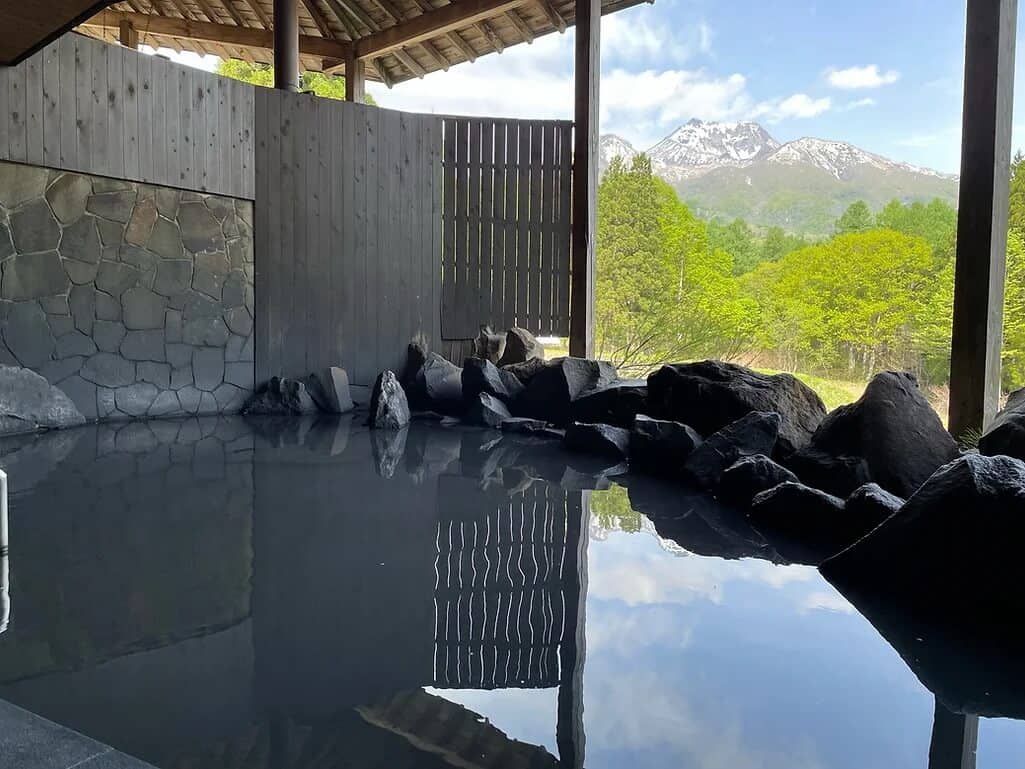
The Alpen Blick hotel has spa day tickets available for purchase, meaning you can make the most of their facilities on an off day and unwind as much as you need.
With rotenburo and onsen available, you can soak in the black waters of Ikenotaira onsen is high in humic acid - an exfoliant that leaves your skin feeling soft, smooth and moisturised.
Eating and Drinking in Myoko
Despite the mountainous remote location of the ski resort, you can enjoy a variety of food and drink in Myoko - including excellent seafood from the nearby fishing port of Toyama. This combined with fertile alpine grounds and the harsh snowy winters has lead to a number of one of a kind foods to be eaten.
Pork Miso Ramen
This is exactly what it says on the tin. Tender pork, umami miso, noodles, and a bunch of extras. you know it's good.

We recommend The Ramen Hiramoto, in Suginohara. Just a 6 minute stroll up the tracks from SLEEEP Myoko.
Kanzuri - Spicy Local Pride
A treat for spicy food lovers - this special little chilli paste is made only in Myoko, through a unique snow-fermentation. The taste is spicy, but won't blow your head off, and is intensely umami due to the use of koji - the same fungus that turns soybeans into miso paste.
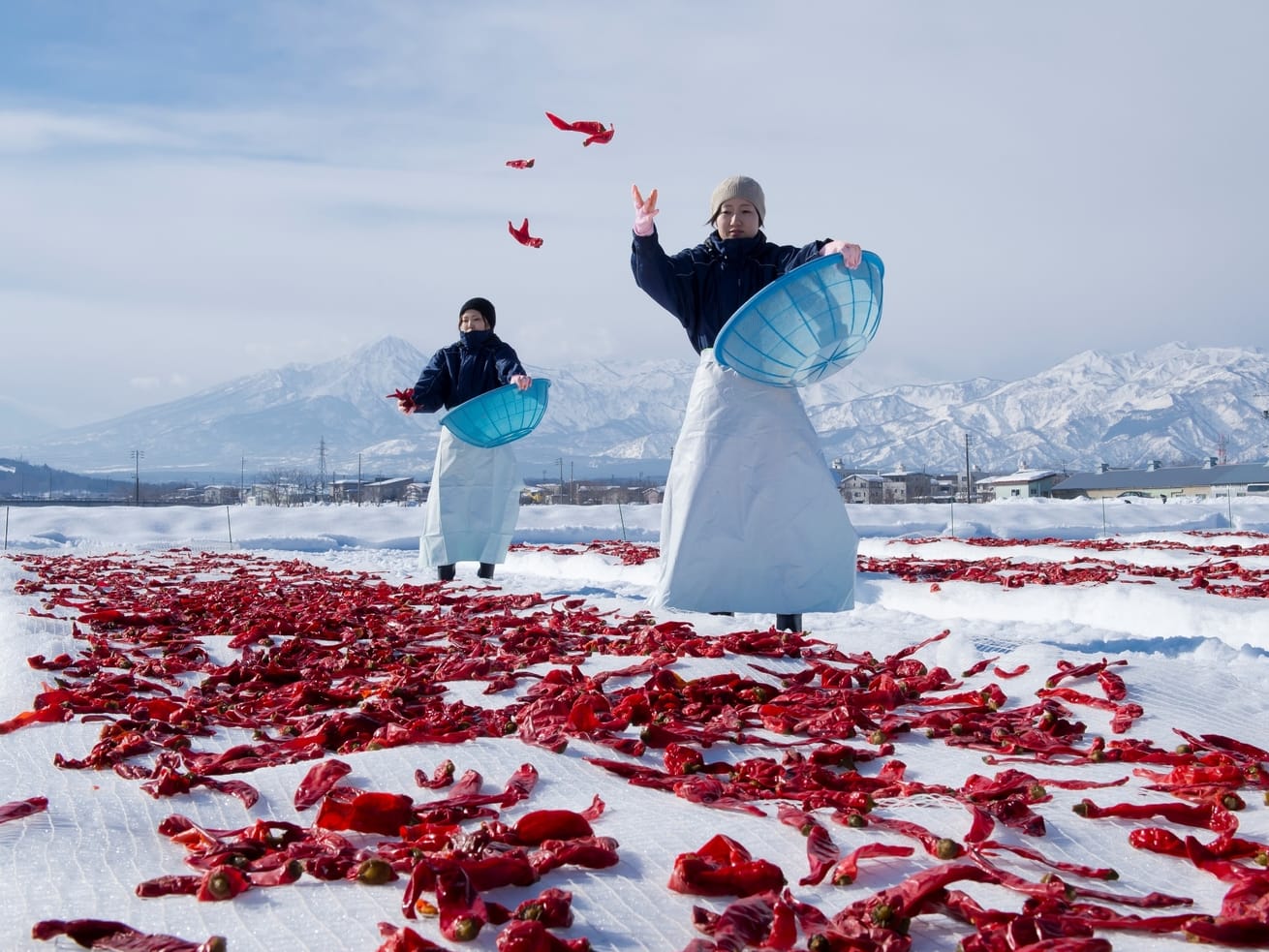
You can actually visit the Kanzuri factory to grab a few jars of your own, but the paste features on tables across Myoko.
Sasazushi - Historical Bamboo Leaf Sushi
Sasazushi is a regional type of sushi, that's origins can be traced back to the feudal 1500s in Nagano. It translates directly to bamboo leaf sushi, and it's exactly that. Sushi served on top of, or wrapped in bamboo leaf. It's usually topped with seasonal and local ingredients including Shinshu salmon.
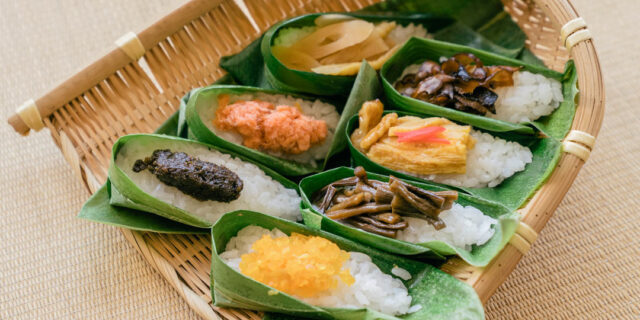
You can grab these in bento boxes sold at local roadside stations or within supermarkets. Local restaurants will also serve sasazushi sometimes!
Spring-water Beer
Finally! Just because Myoko has a reputation for being quieter, doesn't mean you can't enjoy a good drink. Myoko is especially famous for its beer, that uses the natural spring waters in their brewing process.
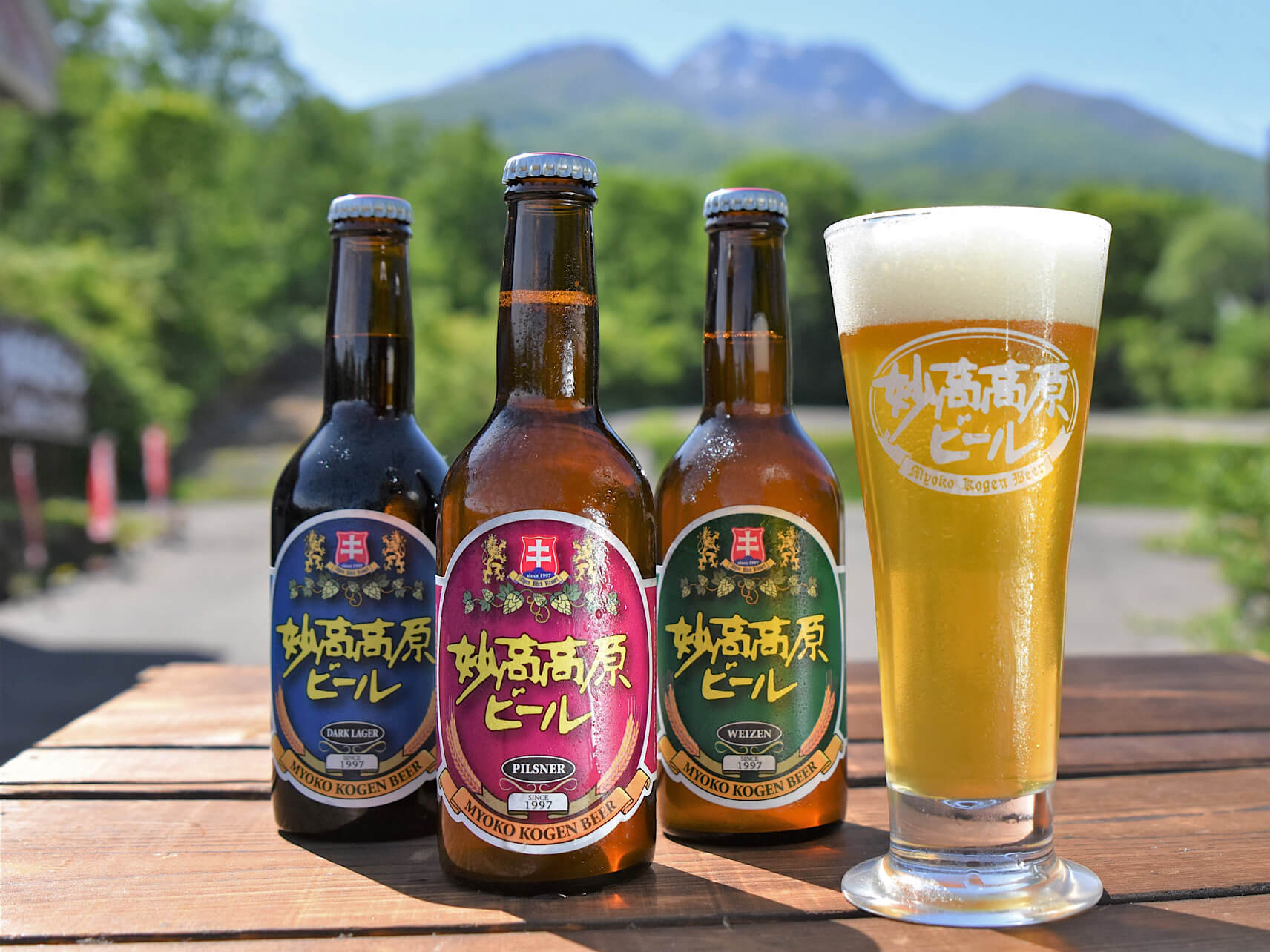
You can enjoy these at local stores, or pay a trip to the beer hall at Tatra-kan. It's a buffet venue with a nomihodai (all you can drink) option - so you can give them all a try if you like!
Local, Handmade Sake
For those that prefer their tipple in the rice wine format, Myoko is also home to the Kimi no I sake brewery. Founded in 1842, and having brewed in their current location since 1904, it's safe to assume that these guys really know what they're doing. Between the natural refrigeration the mountain provides, fresh spring water, and the brewery's location along ancient trade routes, Kimi no I has thrived.
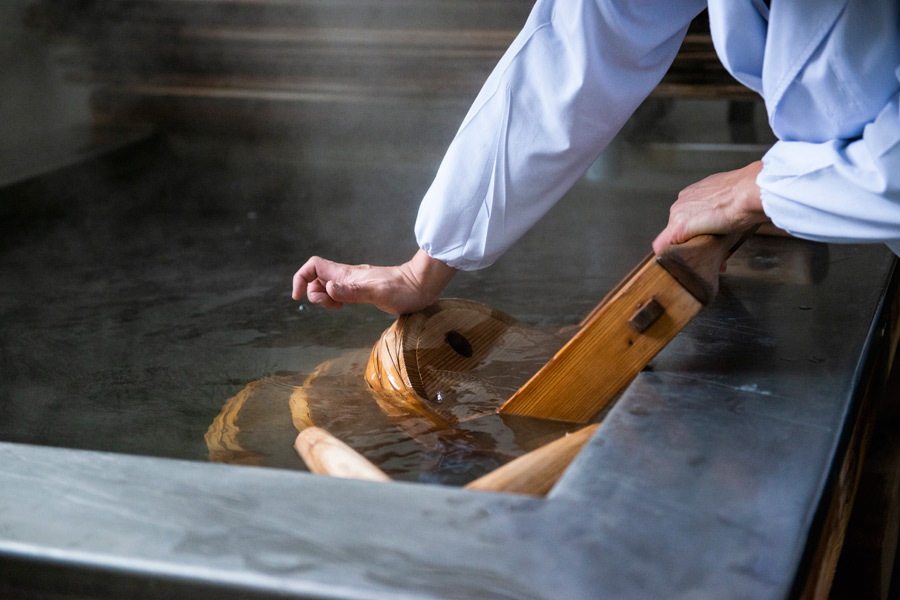
Tours of Kimi no I are freely available! They are, however, conducted in Japanese. Never too late to pick up Duolingo! speak to the XOs at SLEEEP Myoko, an they can help you to organise your tour.
Myoko's Major Festivals
Japan's event calendar is packed full of interesting things to do. Myoko itself has some particularly fun ones.
Dontoyaki (mid January)

A late welcome to the new year, where participants burn new years decorations and calligraphy to pray for prosperity, and better handwriting.
The fire roasted mochi eaten over this festival is said to prevent ill-health for the next year. The highlight of the festival is the fireworks show at the end of the festivities!
Dontoyaki is right on the doorstep of SLEEEP Myoko, in the Suginohara ski area. Definitely not one to miss!
Kamakura Festival of Lights (February/March)
One of the most beautiful times in Myoko can be found at the Festival of Lights in February - igloos, and miniature igloos that candles are placed on.
The practice fills the slopes with a soft glow and a warm fuzzy feeling.
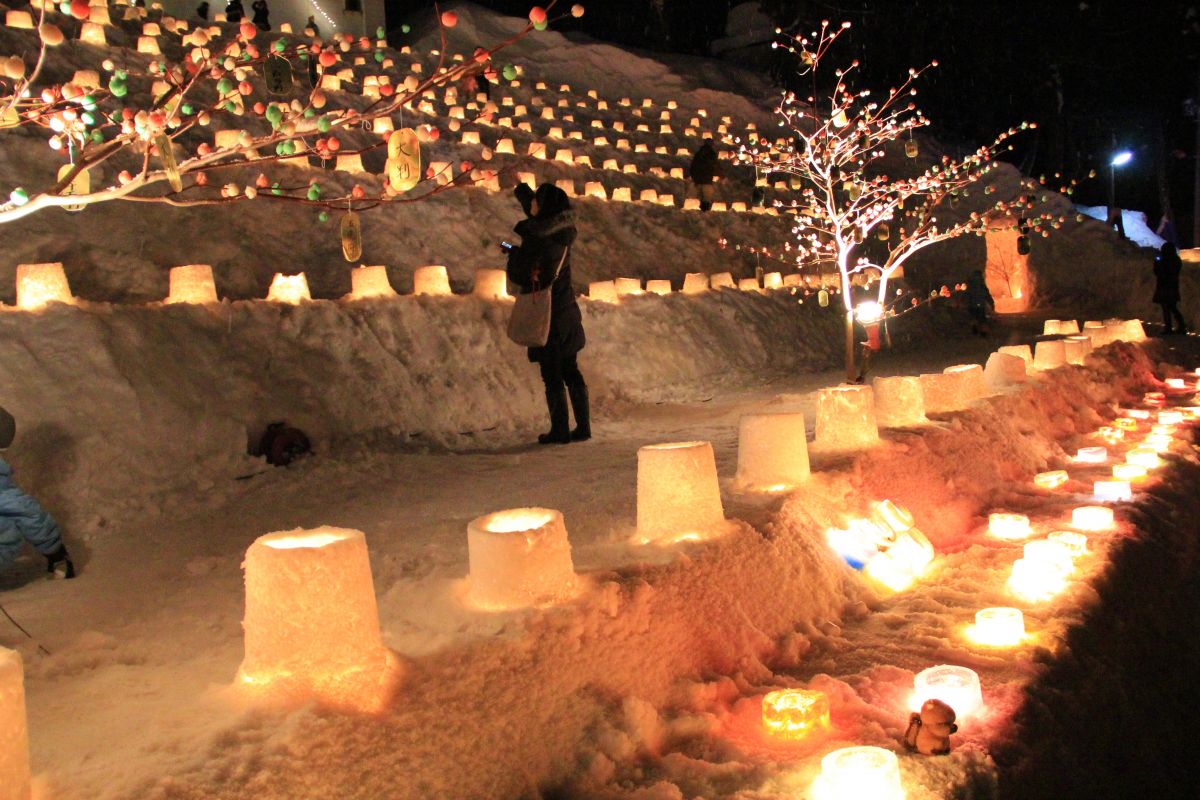
The Myoko Kamakura Festival of Lights is centred around the Akakura Onsen resort. As well as the many, many kamakura, attendees can enjoy ice bars set up inside of larger kamakura, and a large assortment of food and drink, including Amazake (a sweet rice based drink) for the non-alcoholic beverage enjoyers.
Natural Beauty in Myoko
the natural attractions are oft overlooked in the winter in favour of more high-speed, snow based pursuits, but they're not to be missed. In winter conditions they take on a completely different character, and can be a once in a lifetime experience.
That being said, when travelling to these attractions, we encourage you to consider safety first, and to always check weather conditions and make sure you are equipped with suitable equipment and tools before you head out.
Naena-taki

Just down the road from SLEEEP Myoko, Naena-taki is a must see. Note that you may need to use snowshoes or cross country skis to have the best time getting there; nevertheless, it's close by and it's beautiful.
You can find the waterfall here.
Snowshoeing
There are a number of snowshoe courses around the Myoko area, the closest to Suginohara being Ikenotaira. These courses will take you into the forests to explore the woodlands in the thick of winter.

Snowshoe hire is available at centres near the courses including the Ikenotaira Visitors Center. Once again it's vital to consider the weather and preparation when embarking on adventures like these.
You can find a number of the courses available here.
Myoko's Hidden Culture
For the architecture and culture enthusiasts amongst us, Myoko is also equipped with some of the most beautiful shrines in the country. The spiritual roots of Myoko are a must see.
Togakushi Shrine
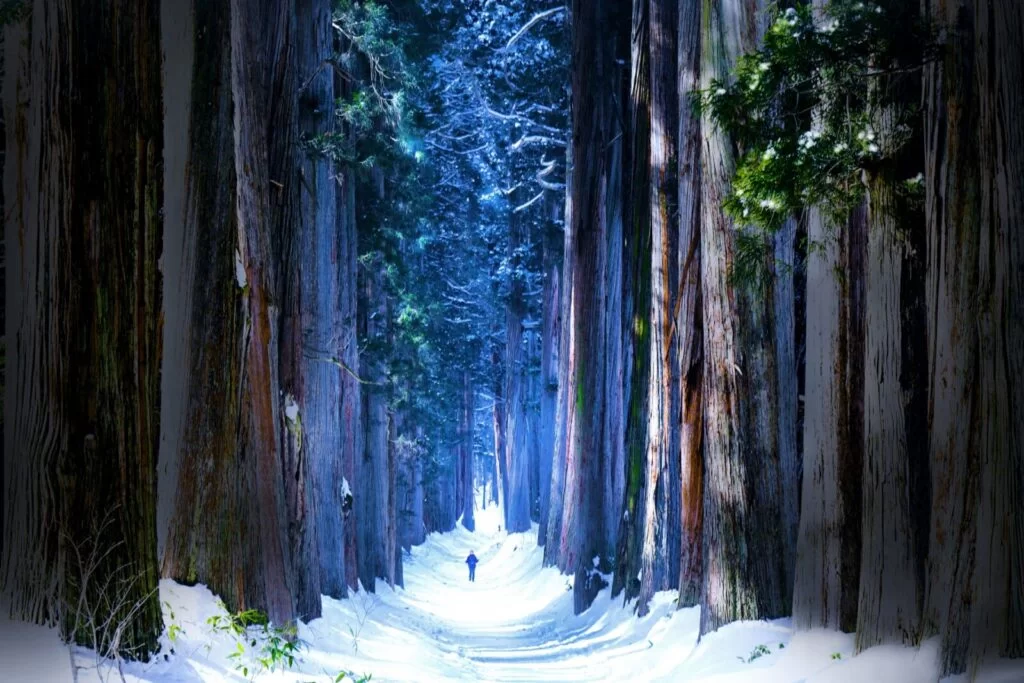
A complex of five Shinto shrines is nestled in the mountains - this is a site which is extremely important to the legend of Amaterasu (the Shinto Sun Goddess).
Togakushi translates to 'hiding door' and is said to be where Amaterasu hid, and was eventually found, bringing sunlight back to the world.
As you walk the avenue of cedars, you are walking towards Mount Togakushi - the stone that Amaterasu was said to be hiding behind. It is an unforgettable experience that epitomises the intersection of spirituality and nature.
Just a 45 minute drive from Myoko-Kogen, it's certainly a trip worth making.
Zenko-ji Temple
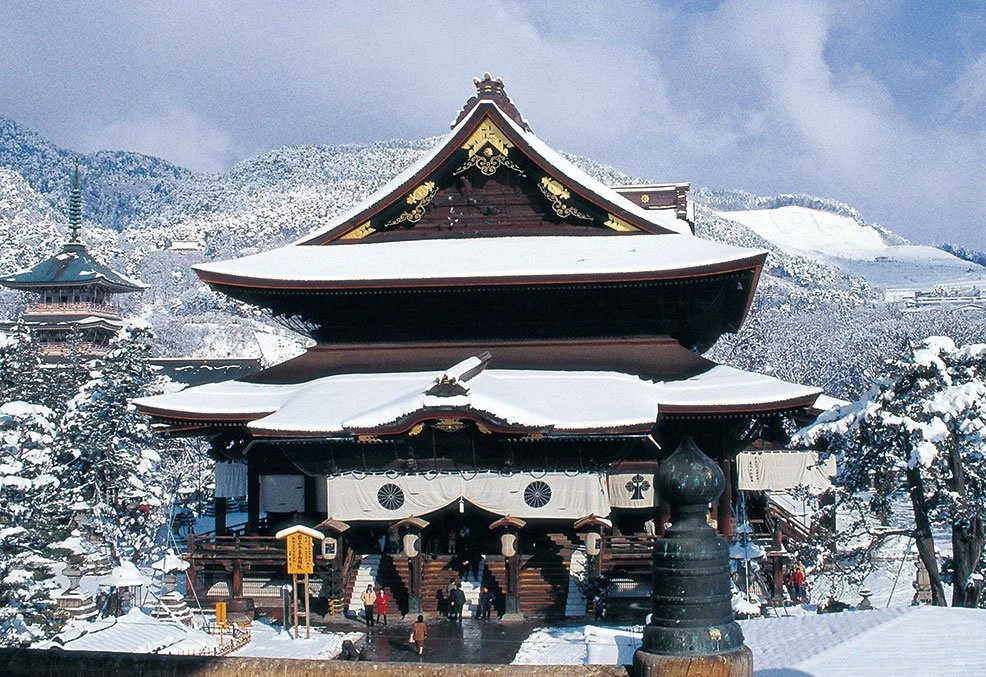
The complex found in Nagano city is filled with small shops and restaurants, making it more than just a sightseeing trip.
That being said, the complex is one of the most important and famous religious sites of Japan. Home to the first ever Buddhist statue brought to Japan (around 552 AD). The statue itself is sealed from view and has been since the year 654 AD - not even the temple's head priest is permitted to lay eyes on it. A replica is displayed once every seven years in The Gokaicho Ceremony and draws pilgrims from far and wide.
Visitors can walk The O-kaidan Meguri or The Key to Paradise: a pitch black corridor that houses a hidden metal key attached to the wall, believed to grant safe passage into the afterlife. This experience is meant to symbolise the journey from death to rebirth.
Just an easy train ride away from Myoko, it's yet another must see for enthusiasts.
Co-Cook Your Dinner
Getting a dinner booking in Myoko can be hard... but luckily there's a foolproof workaround. Yes you may have to get your hands a little dirty, but you'll also get to spend the evening meeting some great people.
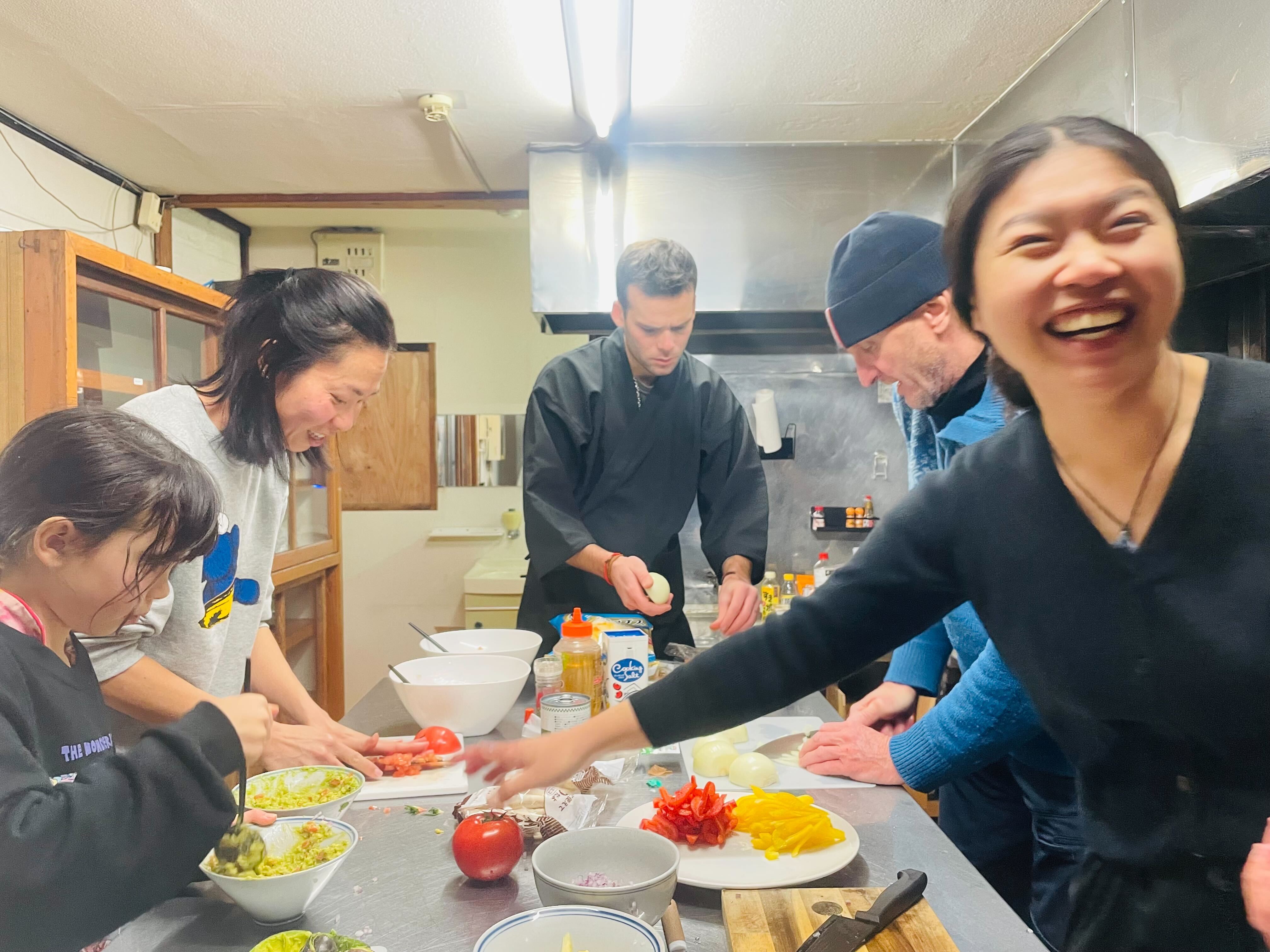
With everything on the menu from bolognese, to tacos, to hot pot and hand rolls! If you sign up to a co-cooking evening at SLEEEP Myoko, there are two things that are certain; a full stomach and a good time. Pay a flat charge of around ¥2000 to cover the costs of catering, but your main contribution to the evening will be your help - either in prepping the dinner, tidying up, or bringing something to share. SLEEEP Myoko welcomes both guests and non-guests with open arms as the co-cooking is more about building the community in Myoko than anything else.
So, if you don't have any plans for dinner, and you don't really fancy the hassle of organising transport to another resort from Suginohara; then a co-cooking evening at SLEEEP Myoko is for you.
You can reach out to us at xo.jp@exp.is to get more information and confirm your attendance!
Anything in the snow apart from skiing!
As you've now discovered, Myoko is hardly a location limited to just skiing and boarding the mountains; but that doesn't mean the mountains don't have more to offer!
Sledding and Tubing
One for all the family. Safe, close by, and always a blast.

Yet another inclusive Suginohara gem - the resort boasts a dedicated play area near the base of the resort. You won't have to worry about rogue high speed boarders or skiiers, and can enjoy a leisurely day tubing and sledding. Perfect for those with young children or sore limbs!
Snowmobiling
Further afield, you can engage in some higher-octane pursuits, including snowmobiling across snow covered rice-paddies.
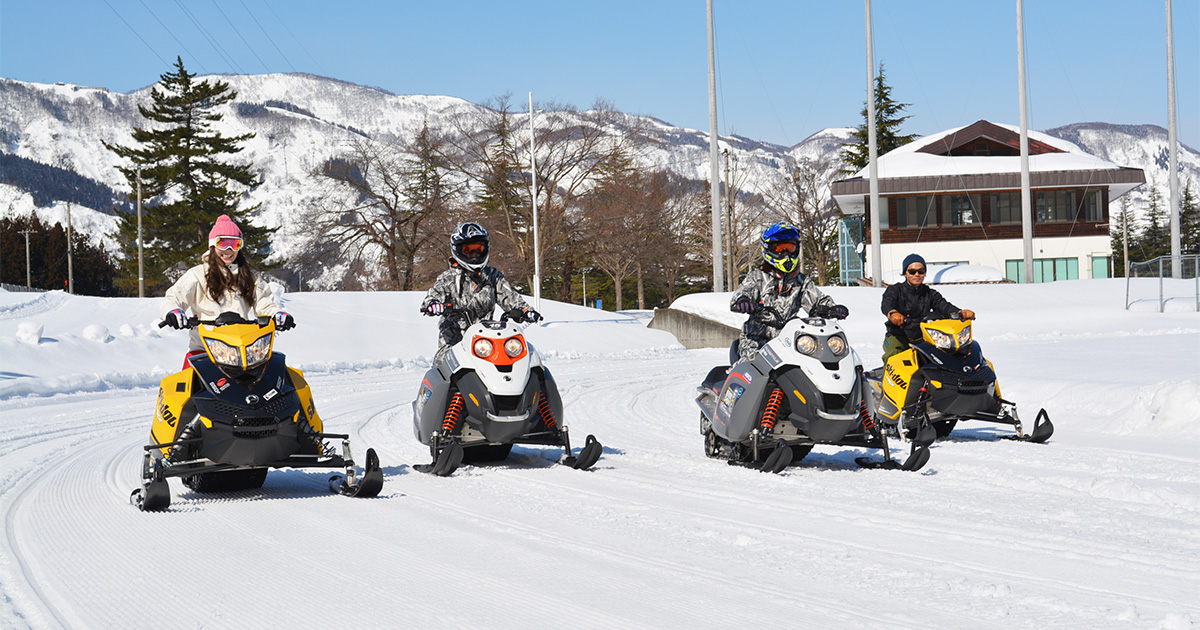
Offering a number of different tours Yukisato are a Myoko-Joetsu based operation who can do everything from teaching you the basics, to deep forest exploration. It's important to note that participants under the age of 16 will need to ride with an instructor.
Bookings for this experience open in December, so snap them up quickly!
Community Events @ SLEEEP Myoko
Last, but certainly not least, SLEEEP Myoko will be offering community events during the season , from start to finish!
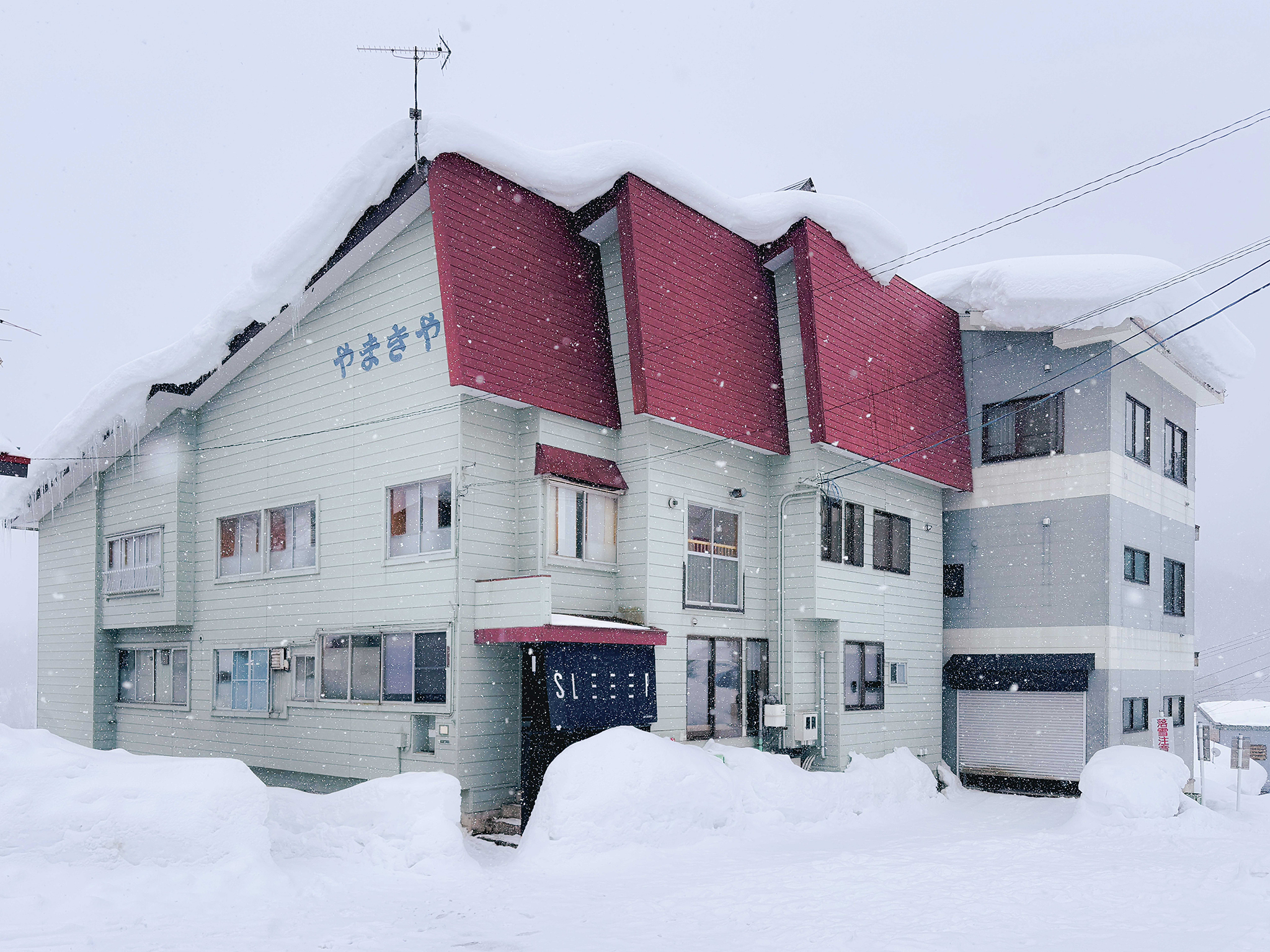
Christmas parties and dinners, New Years Celebrations, group ski trips up the mountain, day trips to neighbouring resorts - the lot! Find our community events on the noticeboard in the lobby, or just ask one of our XOs for details!



